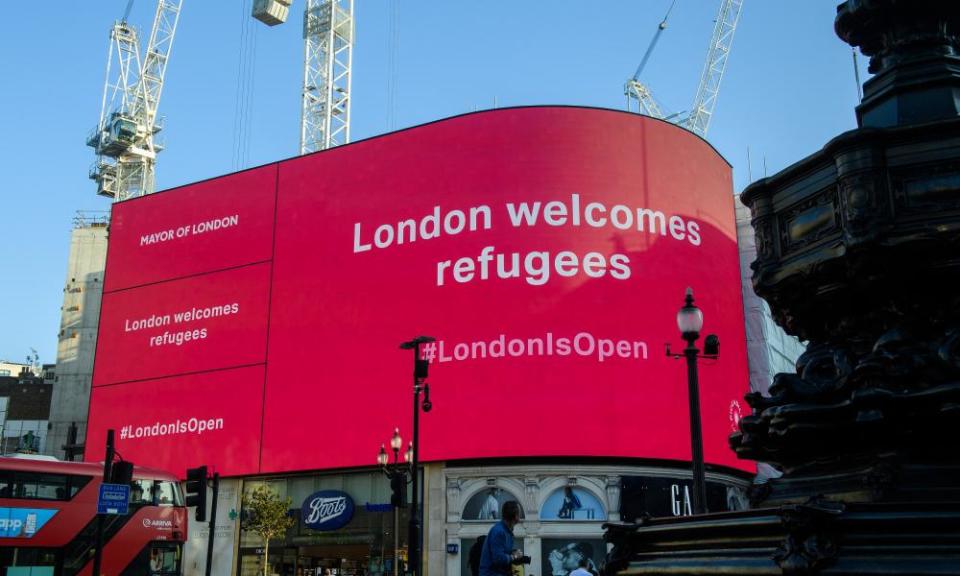A friend in need: volunteers rush to help refugees feel at home in UK

The UK’s largest refugee befriending scheme has closed applications in London following a meteoric rise in sign-ups amid the Afghanistan withdrawal.
Until recently HostNation, a befriending programme set up in 2017 to connect asylum seekers and refugees to locals, received about 10 applications a month – but as news of the Afghan crisis flooded screens, volunteer inquiries surged to more than 50 in just one day.
“We always felt like there was an awful lot of goodwill in the community, people who wanted to befriend refugees but didn’t really know how,” founder Anneke Elwes said, adding that the charity is still recruiting befrienders in north-east England.
Related: As Afghan refugees arrive in the UK, what can you do to help?
The scheme has matched more than 450 refugees and asylum seekers with locals since its creation four years ago. While the vast majority so far have been in London, HostNation began connecting people in Teesside earlier this year, and hubs in Tyneside and Greater Manchester are in the pipeline.
Hafez*, a 40-year-old refugee from north Africa living in London, had some initial reservations about getting involved in the scheme. He was granted refugee status earlier this year after two years in limbo, and has struggled with isolation and anxiety, but agreed to meet Sara Di Pietrantonio and Salvatore Cacciola, both 37, over the summer. “I wasn’t sure what they would be able to do for me. But really, they’ve changed my life in London. They gave me a piece of happiness, to be honest.”
In the past decade the number of asylum seekers waiting for more than a year for a decision has increased almost tenfold from 3,588 people in 2010 to 33,016 in 2020, analysis by the Refugee Council shows, and charities have called on the Home Office to overhaul the system after a number of young asylum seekers killed themselves. Hafez, who has applied for family reunification, said the isolation has been tough. “My mind was blocked with worry about my situation, my family. You cannot work, you don’t have anyone checking on you,” he said. “Now, Sara and Salvatore text me, asking how are you doing, are you OK? They gave me some space for fun and kindness.”
When Di Pietrantonio and Cacciola moved to London in 2014, they didn’t know anyone in the city. “We’re conscious that our experience doesn’t compare to a refugee’s, because we came here for work,” Di Pietrantonio said. “But, to some extent, we understand how difficult it is to be in a place where you need to start from scratch.” Cacciola added: “London is not an easy city from that point of view – meeting new people is really hard.”
London is not an easy place to start from scratch in – meeting people is really hard.
Salvatore Cacciola, befriender
George Wigzell, 36, from Leeds, and Said Altinsoy, a 26-year-old refugee from Turkey, also met through the scheme. “I came in 2018, but I only knew Turkish people in London,” Altinsoy said. “I wanted to meet more people so I could feel involved in the community.” He said the friendship has improved his English and the two often meet to play football together. They don’t support the same team – Altinsoy backs Liverpool, while Wigzell is a Leeds fan – although Wigzell said it isn’t “enough of a sore point” to stop them being friends.
“It’s probably as beneficial for the befriender as it is for the befriendee,” Wigzell, who now lives in London, said. “It’s always fun to hang out with somebody new and learn about each other’s culture, and it’s great to show off the city you live in and love.”
The first match HostNation made four years ago remain firm friends, Elwes said, adding that the majority of people stay in touch. She described the scheme as being about “bringing people together through acts of hospitality and inclusion”, saying: “We introduce people as individuals to one another, in the hope that a friendship is struck up. We wanted to get away from the titles of ‘volunteer’ and ‘refugee’, so that something more organic can emerge.”
Befriending is about helping people who have settled in the UK to feel at home, Wigzell said. “It’s often difficult for asylum seekers to meet people who are not in the same situation. It’s about getting refugees here to feel like they are Londoners, too.”
Or, as Hafez put it: “I feel that I have family here.”
* Not his real name

 Yahoo Finance
Yahoo Finance 